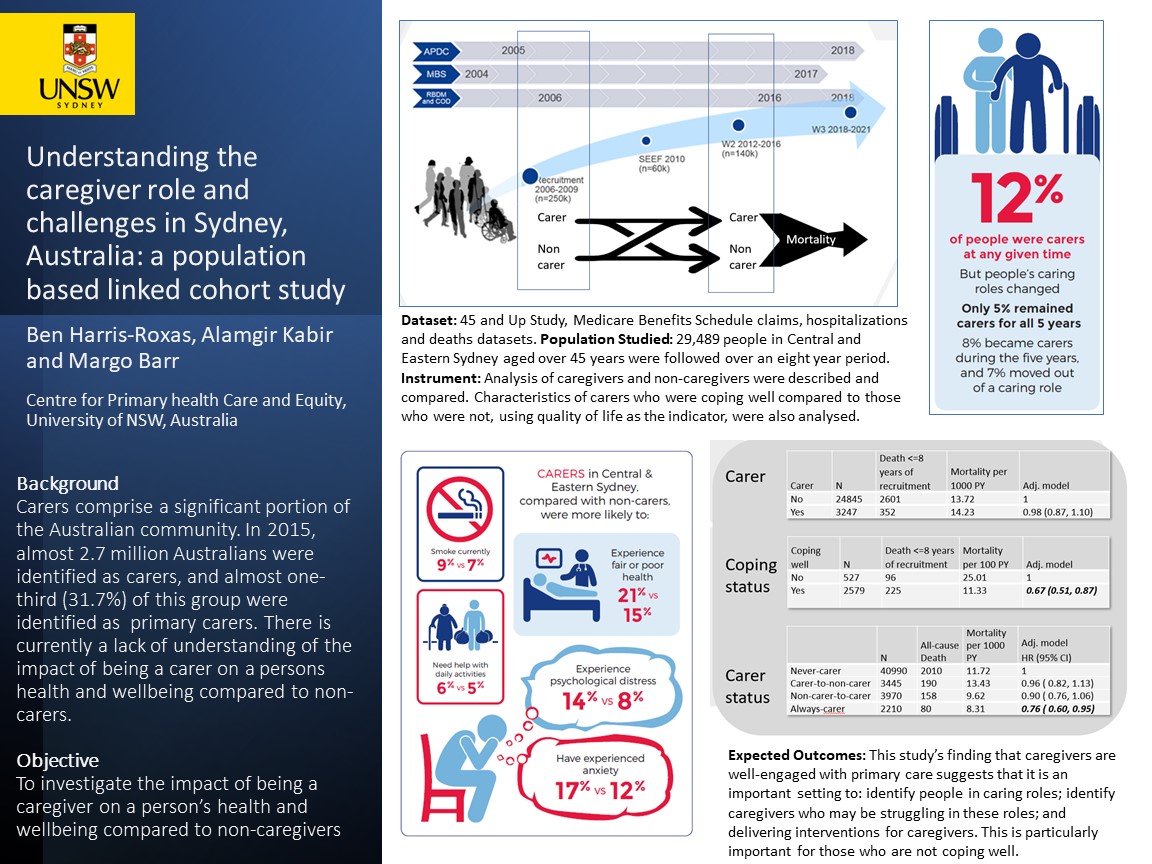SRFP112: Understanding the caregiver role and challenges in Sydney, Australia: a population based linked cohort study
Ben Harris-Roxas, PhD, BSW MPASR; A Y M Alamgir Kabir; Margo Barr, PhD, BSc, MPH
Abstract
Context: Caregiver comprise a significant portion of the Australian community. In 2015, almost 2.7 million Australians were identified as caregivers, and almost one-third (31.7%) of this group were identified as primary carers. Objective: To investigate the impact of being a caregiver on a person’s health and wellbeing compared to non-caregivers. Study Design: A record linkage study using questionnaire data linked with eight datasets. Dataset: 45 and Up Study, Medicare Benefit Scheme claims, hospitalizations and deaths datasets. Population Studied: 29,489 people in Central and Eastern Sydney aged over 45 were followed over an eight year period. Instrument: Analysis of caregivers and non-caregivers were described and compared. Characteristics of carers who were coping well compared to those who were not, using quality of life as the indicator, were also analysed. Outcome Measures: primary care use, hospitalizations and mortality. Results: Compared with non-caregivers, caregivers in CES were more likely to be: female, married, speak a language other than English, current smoker, engaging in adequate physical activity, have ever had anxiety, psychological distress, heart disease, self-rated poor quality of life and less likely to be older, have higher incomes, and need help with daily activities. Caregivers had higher rates of primary care use than non-caregivers [Adj. HR (95% CI): 1.21(1.13, 1.30)]. However, hospital admissions and mortality were not significantly different. Compared with caregivers who were not coping well, caregivers who were coping well, once adjusted for all of the other covariates, were more likely to self-report good quality of health, and less likely to have high psychological distress. Caregivers who were coping well were 24% less likely to be high primary care users [Adj. HR (95% CI): 0.76 (0.63, 0.94)] and had 33% lower mortality rates [Adj. HR (95% CI): 0.67 (0.51, 0.87)]. Hospital admissions were not significantly different. Expected Outcomes: This study’s finding that caregivers are well-engaged with primary care suggests that it is an important setting to: identify people in caring roles; identify caregivers who may be struggling in these roles; and delivering interventions for caregivers. This is particularly important for those who are not coping well.

Jack Westfall
jwestfall@aafp.org 11/21/2021Terrific poster and presentation. Thanks for your work. Thanks for sharing at NAPCRG